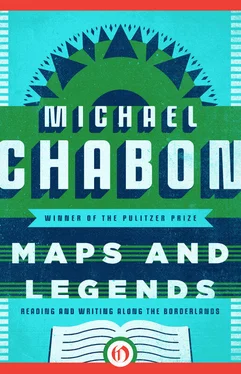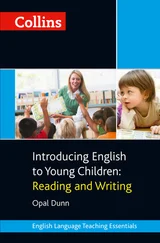Nevertheless, the proliferation of points of view and different quests, which expands still further in the third volume, The Amber Spyglass, is itself a kind of figure for the necessary loss of innocence, for the felix culpa, or Fortunate Fall, that lies at the heart of this deliberate, at times overdeliberate rejoinder or companion to Paradise Lost. As Lyra’s daemon comes ever closer to settling in its final form, the narrative itself grows ever more unsettled; for a single point of view is a child’s point of view, but a multiple point of view is the world’s. And the settling of a daemon into a single form with the onset of adulthood, Pullman tells us, represents not simply a loss of the power to change, of flexibility and fire; it also represents a gain in the power to focus, to concentrate, to understand, and, finally, to accept: a gain in wisdom. Even Mrs. Coulter, that wicked, wicked woman, is granted her place in the narrative, and Pullman (not entirely successfully) makes us privy to her heart.
I have resisted trying to summarize, and thereby spoil, the vast, complicated plot of His Dark Materials, which runs to more than twelve hundred pages. But there is no way to form or convey a judgment of the sequence without giving away the name, alas, of the ultimate, underlying villain of the story, a character whose original scheme to enslave, control, and dominate all sentient life in the universe is threatened first by the implications of Dust as felix culpa and then by the ambition of the new Lucifer, Lord Asriel, with whose Second Rebellion the plot of The Amber Spyglass is largely concerned. The gentleman’s name is Jehovah.
† The original British title of The Golden Compass is Northern Lights.
4.
The Amber Spyglass was awarded the Guardian’s fiction prize for 2000, the first time that a novel ostensibly written for children had been so honored. Shortly afterward, the new laureate stirred up controversy by publicly attacking his fellow Oxonian C. S. Lewis, and in particular the Narnia books (which also begin, of course, in a wardrobe), calling them racist, misogynist, and allied with a repressive, patriarchal, idealist program designed to quash and devalue human beings and the world — the only world — in which we have no choice but to live and die.
Or something like that. I confess to taking as little interest in the question of organized Christianity’s demerits as in that of its undoubted good points, in particular when such a debate gets into the works of a perfectly decent story and starts gumming things up. My heart sank as it began to dawn on me, around the time that the first angels begin to show up in The Subtle Knife, that there was some devil in Pullman, pitchfork-prodding him into adjusting his story to suit both the shape of his anti-Church argument (with which I largely sympathize) and the mounting sense of self-importance evident in the swollen (yet withal sketchy) bulk of the third volume and in the decreasing roundedness of its characters. By the end of the third volume, Lyra has lost nearly all the tragic, savage grace that makes her so engaging in The Golden Compass; she has succumbed to the fate of Paul Atreides, the bildungsroman hero turned messiah of Dune, existing only, finally, to fulfill the prophecy about her. She has harrowed Hell (a gloomy prison yard, according to Pullman, less Milton than Virgil, home of whispering ghosts cringing under the taunts and talons of the screws, a flock of unconvincing harpies), losing and then regaining her daemon-soul; she has become, like all prophesied ones and messiahs, at once more and less than human.
This is a problem for Pullman, since His Dark Materials is explicitly — and materially, and often smashingly — about humanity. That’s the trouble with Plot, and its gloomy consigliere, Theme. They are, in many ways, the enemies of Character, of “roundedness,” insofar as our humanity and its convincing representation are constituted through contradiction, inconsistency, plurality of desire, absence of abstractable message or moral. It’s telling that the epithet most frequently applied to God by the characters in His Dark Materials is “the Authority.” This fits in well with Pullman’s explicit juxtaposition of control and freedom, repression and rebellion, and with his championing of Sin, insofar as Sin equals Knowledge, over Obedience, insofar as that means the kind of incurious acceptance urged on Adam by Milton’s Raphael. But the epithet also suggests, inevitably, the Author, and by the end of His Dark Materials one can’t help feeling that Will and Lyra, Pullman’s own Adam and Eve — appealing, vibrant, chaotic, disobedient, murderous — have been sacrificed to fulfill the hidden purposes of their creator. Plot is fate, and fate is always, by definition, inhuman.
Thank God, then, for the serpent, for the sheer, unstoppable storytelling drive that is independent of plot outlines and thematic schemes, the hidden story that comes snaking in through any ready crack when the Authority’s attention is turned elsewhere. In Paradise Lost, we find ourselves, with Blake, rooting for the poets, for the “devil’s party.” Satan is one of us; so much more so than Adam or Eve. There’s a puzzling pair of exchanges in The Amber Spyglass, when Lyra attempts to cheer the denizens at the outskirts of Hell, and sing for her supper, by telling them the story of her and Will’s adventures up to that point. Like the accounts that Odysseus gives of himself, Lyra’s is a near-total fabrication, replete with dukes and duchesses, lost fortunes, hairbreadth escapes, shipwrecks, and children suckled by wolves, and it’s meant to be absurd, “nonsense”; but in fact it’s made out of precisely the same materials, those dark materials of lies and adventure, as His Dark Materials. And the poor dwellers of the suburbs of the dead, listening to Lyra’s tale, are comforted. It comes as a surprise, then, when having reached the land of the dead itself, Lyra’s tale, with the apparent complicity of the narrator, is violently rejected by the Harpy, that humorless, bitter, inhuman stooge of God: “Liar!” Later, the Harpy hears Lyra’s more accurate account of her voyage and approves it, because, apparently, it sticks to the facts and includes references to the substance of the corporeal world that the Harpy has never known. But so does the lie; and so, in spite of, or in addition to, its stated, anti-Narnian intentions, does His Dark Materials.
Lies, as Philip Pullman knows perfectly well, tell the truth; but the truth they tell may not be that, or not only that, which the liar intends. The secret story he has told is not one about the eternal battle between the forces of idealist fundamentalism and materialist humanism. It is a story about the ways in which adults betray children; how children are forced to pay the price of adult neglect, cynicism, ambition, and greed; how they are subjected to the programs of adults, to the General Oblation Board. Each of its child protagonists has been abandoned, in different ways, by both of his parents, and while they find no shortage of willing foster parents, ultimately they are betrayed and abandoned by their own bodies, forced into the adult world of compromise and self-discipline and self-sacrifice, or “oblation,” in a way that Pullman wants us — and may we have the grace — to understand as not only inevitable but, on balance, a good thing.
Still, we can’t help experiencing it — as we experience the end of so many wonderful, messy novels — as a thinning, a loss not so much of innocence as of wildness. In its depiction of Lyra’s breathtaking liberty to roam the streets, fields, and catacombs of Oxford, free from adult supervision, and of Will’s Harriet the Spy-like ability to pass, unnoticed and seeing everything, through the worlds of adults, a freedom and a facility that were once, but are no longer, within the reach of ordinary children; in simply taking the classic form of a novel that tells the story of children who adventure, on their own, far beyond the help or hindrance of grown-ups, His Dark Materials ends not as a riposte to Lewis or a crushing indictment of authoritarian dogma but as an invocation of the glory, and a lamentation for the loss, which I fear is irrevocable, of the idea of childhood as an adventure, a strange zone of liberty, walled, perhaps, but with plenty of holes for snakes to get in.
Читать дальше
Конец ознакомительного отрывка
Купить книгу












